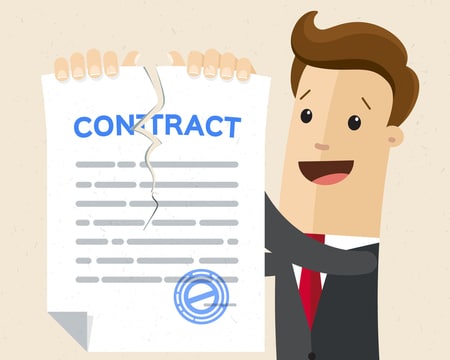Home Inspection Contract Language: Top 5 Things to Include in Your Pre-Inspection Agreement
Last Updated November 9, 2023

 Pre-inspection agreements are the foundation for your protection as a home inspector. Without them, clients have to assume what inspections will entail. And, as inspector and mentor Jan Banks stated in a previous article, clients who aren't given clear expectations often confuse inspections with warranties. That leaves inspectors open to a lot of unnecessary risk.
Pre-inspection agreements are the foundation for your protection as a home inspector. Without them, clients have to assume what inspections will entail. And, as inspector and mentor Jan Banks stated in a previous article, clients who aren't given clear expectations often confuse inspections with warranties. That leaves inspectors open to a lot of unnecessary risk.
But simply having an inspection agreement doesn't mitigate a home inspector's risk. To best avoid potential claims, home inspectors need thorough contracts that cater to their specific state law.
Below, we list some of the important provisions to include in your home inspection agreements. Note that the list isn't exhaustive and does not acknowledge requirements by state. The list can, however, give inspectors the groundwork to begin a conversation with knowledgeable, local legal counsel in crafting or revising their home inspection contract language.
What to Include
We highlight the following five contract provisions.
- Exclusions
- Limitation of Liability
- Dispute Resolution
- Statute of Limitations
- Severability
Exclusions
Exclusions are exactly what they sound like: items not covered by your contract. The home inspection contract language excludes these items to avoid excessive liability.
The American Society of Home Inspectors (ASHI) Standard of Practice (SOP) helps determine the scope of a typical inspection. By outlining what inspections are and aren't, the SOP gives inspectors ground to stand on when excluding elements from their contracts.
There are several types of exclusions, including items that you:
- never inspect
- usually inspect, but you may exclude due to extenuating circumstances
- only inspect if the client adds the optional service for a fee
Read on for specifics on each exclusion type with pre-inspection agreement samples.
Items You Never Inspect
Since they're meant to be limited, non-invasive surveys of homes, their systems, and their components, home inspections aren't technically exhaustive. There are some things home inspectors just cannot or will not find, because discovering such defects reaches beyond their capacity. Exclude these items from your pre-inspection agreement so clients have appropriate expectations.
See an example from Arizona's Kelly Home Inspection, LLC below:
The following items are not included in an inspection:
- Window air conditioners
- Portable appliances
- Freezers Landscaping / Fences
- Solar heating systems
- Sprinkler systems
- Private wells
- Water softeners/filters
- Alarms or intercoms
- Humidifiers
- Landscape Lighting
Items You Usually Inspect
Sometimes, items you'd typically inspect are inaccessible or otherwise off-limits. In these instances, it's important to stress your inability to inspect—both by-case in the report and in a blanket statement in the agreement.
See an example, again from Kelly Home Inspection, LLC, below:

Items You Inspect for a Fee
Many home inspectors offer add-ons to their standard home inspections. Under such circumstances, recognize which services are optional rather than automatically included. That way, you're protected if a client claims you included an additional service after they opted out of it.
See another example from Kelly Home Inspection, LLC:
The following items are not included in an inspection unless specified (extra charges apply):
- Swimming pools
- Hot tubs
- Outbuildings
- Guest houses
In addition to underscoring optional items, you may decide to include agreements for additional services. These agreements don't replace your standard agreement. Instead, they add specific terms to the service. See an example from Environmental Solutions Association (ESA) below:

Limitation of Liability
 A limitation of liability clause puts a cap on your financial responsibility for missing or omitting defects. For example, if you miss a roof leak, the client may demand that you pay for a brand-new roof. The limitation of liability clause can restrict the client's demand to no more than double the inspection fee.
A limitation of liability clause puts a cap on your financial responsibility for missing or omitting defects. For example, if you miss a roof leak, the client may demand that you pay for a brand-new roof. The limitation of liability clause can restrict the client's demand to no more than double the inspection fee.
Limitation of liability clauses are important aspects of contract law, both within and outside of the inspection industry. For instance, in our article on why pre-inspection agreements need to be signed prior to every inspection, Harvard Law School Professor Charles Fried discussed contracts' role in protecting against claims. According to Fried, it's wise for home inspectors to get agreements that include limitations to their liability signed to protect themselves from accusations not covered by their inspection insurance. (Read the full article here.)
For an example of a limitation of liability clause, see the excerpt from Illinois' Assure Home Inspections, Inc. below:
Limitation of Liability. The parties agree that the Inspector and its employees are limited in liability to two (2x) times the fee paid for the inspection services and report in the event that Client or any third-party claims that the Inspector is in any way liable for negligently performing the inspection or in preparing the Inspection Report. At the client's option, a comprehensive inspection without limitation of liability is available. A comprehensive inspection includes a contractor, engineer, and architect review of the property for a minimum fee of $2,500.
As stated in the beginning, have local legal counsel assist you in crafting your pre-inspection agreement since state and even county laws vary. With limitation of liability provisions in particular, it’s essential to receive legal assistance, as restrictions on these provisions are extremely location-specific.
Dispute Resolution
Dispute resolution specifies just how clients should file claims. By specifying the process, inspectors make sure that claimants file in a place that will treat them fairly and that's more likely to close cases quickly. Thus, inspectors are more likely to resolve disputes promptly with less impact to their insurance premiums.
See an example of a dispute resolution provision from Assure Home Inspections, Inc. below:
Dispute Resolution. Any controversy or claim between the parties hereto, arising directly or indirectly out of, connected with, or relating to the interpretation of this Agreement, the scope of the services rendered by Inspector, the Inspection Report provided to the Client by Inspector, or as to any other matter involving any act of omission performed under this Agreement, or promises, representations or negotiations concerning duties of the Inspector hereunder, shall be submitted to Small Claims Court in the county in which the inspection takes place. If the alleged damages exceed the jurisdictional limit for Small Claims Court, the dispute shall then be submitted to binding arbitration before Construction Dispute Resolution Services ("CDRS"). If CDRS is unavailable, then by Resolute Systems.
Statute of Limitations
A statute of limitations provision limits a client's ability to file a claim against a home inspector to a specific period of time. Indeed, the purpose of such a statute is to deter clients from coming back with complaints against home inspectors long after their inspection findings are relevant. (i.e. Let's not blame a home inspector for an appliance failing five years after the inspection.)
In fact, past court cases show that the statute of limitations alone can dismiss claims. (For an example, read about the Moreno v. Sanchez case in our previous article here.)
See an example of just the statute of limitations provision from Minnesota's Errickson Home Inspections, LLC below:

Severability
 Sometimes, courts can take issue with one or multiple provisions in a business contract. If the court decides that a clause in your agreement is unfair to your client or is contrary to local law, they can motion to waive your contract altogether.
Sometimes, courts can take issue with one or multiple provisions in a business contract. If the court decides that a clause in your agreement is unfair to your client or is contrary to local law, they can motion to waive your contract altogether.
Enter severability clause. Basically, the clause protects the rest of your contract when a court voids a portion of it. See an example of a severability clause, again from Errickson Home Inspections, below:
GOVERNING LAW & SEVERABILITY
Minnesota Law shall govern this Agreement. If any portion of this Agreement is found invalid or unenforceable by any court or arbitrator the remaining terms shall remain in force between the parties.
Include Proper Home Inspection Contract Language
You're now aware of some of the provisions we recommend including in your home inspection contract language. So, when crafting or editing your own pre-inspection contract, we suggest reviewing agreements from other inspectors in your area. Then, with that information, inspectors can contact local attorneys to help them develop their agreements. Just remember, your contract only protects you if signed before the inspection takes place.
Want more information on what to include in your pre-inspection agreement? Check out the below articles. Or, start from the beginning of our pre-inspection agreement provision series.









